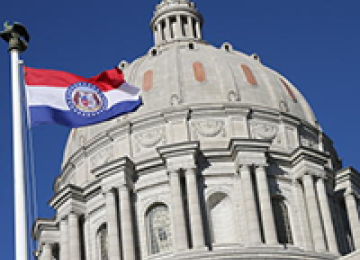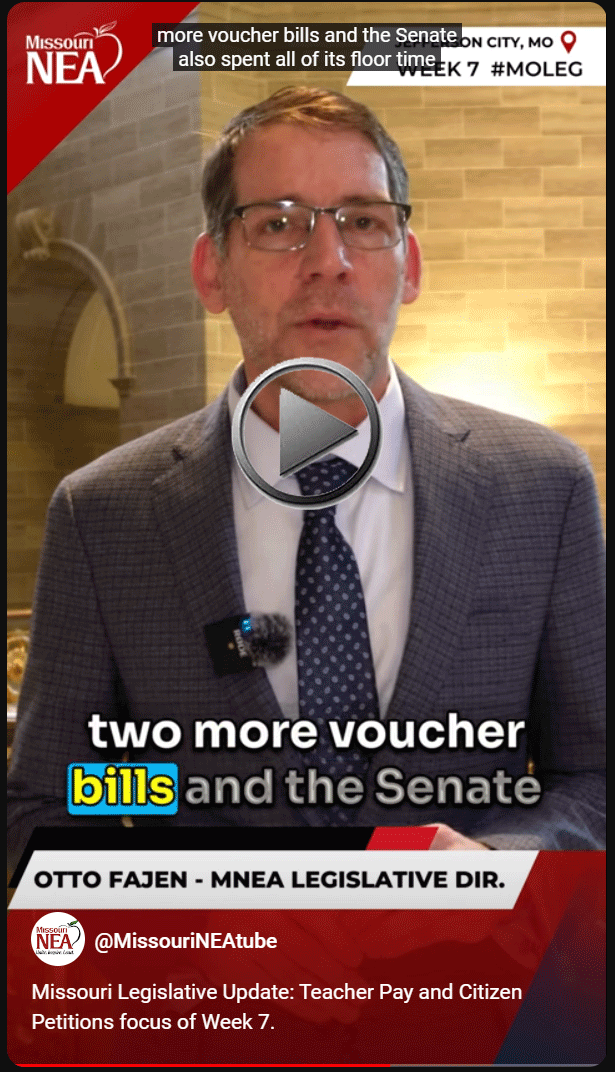By Otto Fajen, MNEA Legislative Director
LEGISLATIVE WEEK SHORTENED FOR SUPER BOWL CELEBRATION
The House and Senate concluded floor session for the week on February 13 to allow interested legislators to participate in upcoming celebrations in honor of the Kansas City Chiefs' victory in Super Bowl LVIII. A few committee hearings will still be held on February 14 and 15, including a meeting of the House Elementary and Secondary Education Committee on February 14.
The House Special Committee on Education Reform met on February 12 to hear four bills that would expand the existing tax credit voucher enacted in 2021. HB 2104 (Phil Christofanelli) and HB 1738 (Doug Richey) are similar bills that make several changes. Each bill expands the program to include all counties in the state, increases the allowable annual amount of credits to $75 million, and raises the qualifying income threshold to 400% of the income eligibility for reduced price school lunch. The bills also increase the maximum per student award by multiplying the State Adequacy Target (currently $6375) by the formula factors for students with identified needs.
HB 1615 (Brad Hudson) expands the program to include all counties in the state, while HB 1671 (Mark Matthiesen) removes the requirement that a qualified student be a kindergarten or first-grade student or have attended at least one semester full-time at a public school within 12 months prior to participation. The Association opposes all four of these bills to expand the tax credit voucher program.
The Senate Select Committee on Empowering Parents and Children heard SB 1391 (Tony Luetkemeyer) and SB 1392 (Curtis Trent) on February 13. Both bills contain provisions expanding the existing tax credit voucher enacted in 2021 and are similar to HB 2104 and HB 1738. SB 1392 would also authorize the establishment of charter schools in St. Louis County, St. Charles County, Columbia school district without sponsorship by the local school board. The Association opposes both SB 1391 and SB 1392.
TEACHER RECRUITMENT AND RETENTION
The House Elementary and Secondary Education Committee approved an HCS version of HB 1447 (Ed Lewis) on February 14. The bill pertains to minimum teacher salaries and related provisions regarding teacher recruitment and retention.
HB 1447 would raise the minimum teacher salary in Missouri from $25,000 to $38,000. The bill also raises the minimum salary for teachers with ten years of experience and a master's degree to $46,000 for the 2027-28 school year. The HCS provides an annual inflationary increase for both salary levels up to a maximum of three percent per year and beginning in the 2028-29 school year. The HCS also creates an ongoing grant fund that could provide state funding to support the salary increases.
The Association believes that salary schedules should provide for entry-level salaries and career earnings comparable to those of other professions and occupations with similar preparation and responsibilities. Increasing minimum salaries is a positive step in meeting this standard. Maintaining improved salaries will require adequate and sustainable funding for all school systems.
HB 1447 contains additional provisions to specify how a district may place teachers on the salary schedule for hard-to-staff areas and hard-to-staff schools. HB 1447 also eliminates the high-stakes entry exam for teacher prep programs and revises the "Urban Flight and Rural Needs Scholarship Program" by increasing the number of scholarships and focusing them on teachers agreeing to serve in hard-to-staff subjects and hard-to-staff schools. The HCS also includes the language of HB 1786 (Brad Pollitt) to allow a certified teacher to earn an additional certification after successfully teaching in that area for two years upon evaluation and recommendation from the employing district and passing a background check.
INITIATIVE PETITION
The Senate debated the Senate Substitute version of SJR 74 (Mary Elizabeth Coleman) on February 12 but did not bring the bill to a vote. The joint resolution seeks to change the initiative petition process and the process of amending the Constitution. The SS raises the approval requirement for constitutional amendments to add a concurrent majority in a least a majority of Missouri's Congressional districts.
The Association is concerned that the resolution will make it more difficult for Missouri citizens to bring forward and gain approval on measures of interest brought by the initiative petition process and opposes the joint resolution.
TECHNOLOGY IN SCHOOLS
The House Special Committee on Innovation and Technology heard HB 2612 (Tricia Byrnes) on February 13. The bill tasks the Literacy Advisory Council, or a subcommittee thereof, to include a review of the best practices for the use of technology in instruction. This review will include the impacts on behavior and discipline, special education, early childhood brain development, and reading and writing skills. The Association supports this proactive approach to provide research and guidance on technology best practices to schools and educators across the state.
FULL-TIME VIRTUAL SCHOOLS
The Senate Select Committee on Empowering Parents and Children heard SB 1375 (Karla Eslinger) on February 13. The bill makes minor revisions to clarify the new structure of accountability, enrollment, participation, and finance created and enacted for full-time virtual schools in 2022 by SS/HCS/HB 1552 (Richey). The Association supports the bill.
The House Elementary and Secondary Education Committee will hear SCR 23 (Nick Schroer) on February 20. The SCR disapproves and suspends the final order of rulemaking for a rule proposed by DESE relating to the Virtual Instruction Program. Several provisions in the rule were inconsistent with the provisions enacted for full-time virtual schools in 2022. The SCR must be approved by both chambers within the first thirty legislative days of session (by the end of the month) to permanently suspend the rule.
HIGHER EDUCATION CREDIT TRANSFER
The Senate Select Committee on Empowering Parents and Children also heard SB 1075 (Andrew Koenig) on February 13. The bill increases the amount of lower-division core curriculum credit hours that a student may transfer among public institutions of higher education from 42 credit hours to 60 credit hours. A transferring student who completes the 60 credit-hour block of courses at one institution shall receive academic credit toward the degree program, rather than simply receiving academic credit.
HOUSE ELEMENTARY AND SECONDARY EDUCATION COMMITTEE
The committee heard two bills on February 14.
HB 1513 (Jim Murphy) pertains to media literacy and critical thinking. The bill requires DESE to create a pilot program on the topic involving five to seven public schools around the state and to submit a report on the program to the legislature by January 1, 2028.
HB 2630 (John Black) pertains to school anti-bullying policies. The bill requires certain changes in district anti-bullying policies, enacts numerous reporting requirements, and creates state financial penalties for districts that fail to comply with the requirements.
SENATE SELECT COMMITTEE ON EMPOWERING MISSOURI PARENTS AND CHILDREN
The committee will meet on February 20 to hear three bills:
SB 749 (Lincoln Hough) to remove degree granting restrictions for research doctorate degrees and certain professional and medical degrees.
SB 784 (Doug Beck) to revise school terms and calendars. The bill requires districts in charter counties and cities with over a population of 30,000 to have at least 169 school days unless voters approve a four-day school week. Districts with a five-day school week will annually receive an additional payment of 2% of the prior year state aid to be used solely to increase teacher salaries. Districts with a school term of at least 175 school days may establish a school starting date prior to 14 days before Labor Day.
SB 907 (Jill Carter) to add health and life sciences and immersive learning experiences to the mission of Missouri Southern State University.



